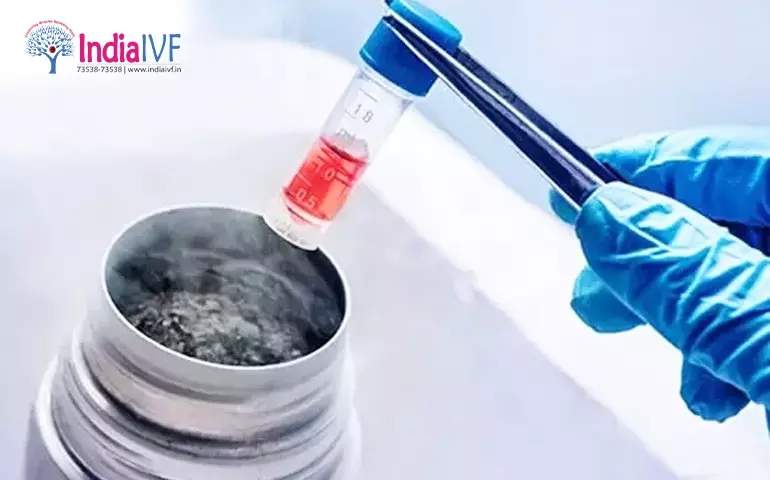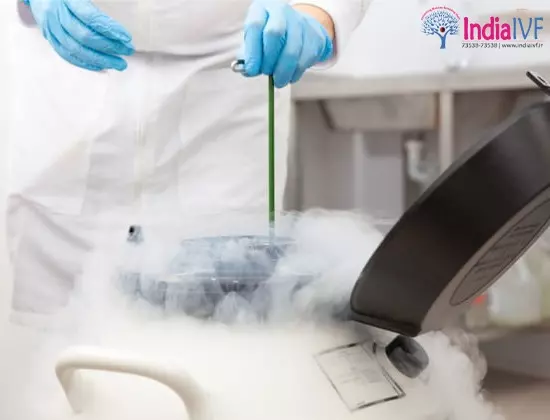Your cart is currently empty!


Egg freezing is a modern reproductive technology that allows women to preserve their fertility by freezing and storing their eggs for future use. This technique has been used for decades to help women with medical conditions, such as cancer, that can impact their fertility. However, more and more women are now choosing to freeze their eggs for non-medical reasons, such as delaying childbearing until they are ready.

Egg freezing, also known as oocyte cryopreservation, is a process in which a woman's eggs (oocytes) are extracted, frozen and stored for future use. This technique is often used by women who want to preserve their fertility for medical reasons, such as cancer treatments that may impact their ability to conceive in the future. However, it has become increasingly popular for non-medical reasons, such as delaying childbearing until a later time. Egg freezing involves stimulating the ovaries to produce multiple eggs, retrieving the eggs through a minimally invasive procedure, and then freezing them using a process called vitrification. The frozen eggs can be stored for an indefinite period of time until the woman is ready to use them. When she is ready, the eggs are thawed, fertilized with sperm, and implanted in the uterus through in vitro fertilization (IVF) to attempt pregnancy.

As women age, the quality and quantity of their eggs decline, which can make it harder to conceive naturally. Egg freezing can help women who want to have children in the future but are not yet ready or able to do so. It can also benefit women who want to ensure they have the option to have children later in life, even if they have not yet found a partner.

Women who are interested in egg freezing should be in good health and have a regular menstrual cycle. It is important to discuss your medical history with a healthcare provider to determine if egg freezing is a viable option for you.

Egg freezing involves a process called vitrification, which is a flash-freezing technique that preserves the eggs in their current state. Once the eggs are frozen, they can be stored for an indefinite period of time until the woman is ready to use them.
Egg freezing, also known as oocyte cryopreservation, is a procedure that allows women to preserve their eggs for future use. The process typically involves the following steps:
The first step in the egg freezing process is to schedule an initial consultation with a fertility specialist. During this consultation, the doctor will review your medical history, perform a physical examination, and discuss the egg freezing process in detail. They will also evaluate your ovarian reserve, which is a measure of your egg supply.
Once you have decided to move forward with egg freezing, you will begin a course of medications to stimulate your ovaries to produce multiple eggs. The medications may be self-administered injections or oral medications, and they typically last for 8-14 days.
Throughout the ovarian stimulation process, your doctor will monitor your hormone levels and perform ultrasound examinations to track the growth and development of your follicles (fluid-filled sacs in the ovaries that contain the eggs).
When the follicles have matured, your doctor will perform an egg retrieval procedure. This typically involves a transvaginal ultrasound-guided needle aspiration, in which a thin needle is inserted through the vaginal wall and into each follicle to retrieve the mature eggs. The procedure is usually done under sedation or general anesthesia and takes about 20-30 minutes.
Once the eggs have been retrieved, they are immediately frozen using a process called vitrification. In this process, the eggs are dehydrated and then rapidly frozen to prevent the formation of ice crystals, which can damage the eggs. The frozen eggs are then stored in a specialized storage tank that maintains a very low temperature (-196°C) until they are ready to be used.
Overall, the egg freezing process typically takes about 2-4 weeks from the start of ovarian stimulation to egg retrieval. The eggs can be stored for an indefinite period of time, and can be thawed and fertilized with sperm at a later date to achieve pregnancy through in vitro fertilization (IVF).
The cost of egg freezing can vary based on several factors. Here’s a breakdown:
| Procedure | Cost (INR) |
|---|---|
| Initial Consultation | 2,000 - 5,000 |
| Ovarian Stimulation | 50,000 - 80,000 |
| Monitoring | 20,000 - 30,000 |
| Egg Retrieval | 50,000 - 70,000 |
| Freezing and Storage (per year) | 15,000 - 30,000 |
There are several indications for egg freezing, also known as oocyte cryopreservation. These include:
Women undergoing cancer treatment, such as chemotherapy or radiation therapy, which can affect their fertility. Egg freezing can help preserve their fertility so that they can have biological children after the treatment.
Women with premature ovarian failure, a condition in which the ovaries stop working before the age of 40, can opt for egg freezing to preserve their fertility.
Women with endometriosis, a condition in which the tissue that lines the uterus grows outside of it, can opt for egg freezing to preserve their fertility.
Women with genetic disorders that can affect their fertility, such as Turner syndrome, can opt for egg freezing to preserve their fertility.
Women who want to delay pregnancy for social reasons, such as pursuing higher education or career goals, can opt for egg freezing to preserve their fertility.
Women who do not have a partner or whose male partner has a low sperm count or poor sperm quality can opt for egg freezing to preserve their fertility.
Women who have a high risk of pregnancy complications, such as pre-eclampsia, gestational diabetes, or premature delivery, can opt for egg freezing to preserve their fertility.
It is important to note that the success rate of egg freezing varies based on several factors such as age, ovarian reserve, and the number of eggs frozen. Women considering egg freezing should consult with a fertility specialist to discuss their individual circumstances and chances of success.
Social egg freezing, also known as elective or non-medical egg freezing, is the process of extracting and freezing a woman's eggs to preserve her fertility for future use. This procedure is different from medical egg freezing, which is performed for women with health conditions that may affect their fertility, such as cancer treatments.
Social egg freezing is an option for women who want to delay pregnancy and preserve their fertility for various reasons, such as:
The benefits of egg freezing include the ability to preserve fertility, the option to delay childbearing, and increased control over family planning. However, there are also potential risks and drawbacks, such as the cost of the procedure, the need for multiple cycles, and the possibility of not being able to use the frozen eggs in the future.
Get free consultation with India IVF Clinic Experts and start your jounrey to Parenthood
Free ConsultationEgg freezing offers a remarkable opportunity for women to take control of their reproductive futures. At India IVF Fertility, we provide comprehensive egg freezing services with expert care. Whether you're in Delhi, Gurgaon, Noida, Srinagar, or Ghaziabad, our team is here to support you every step of the way. Preserve your fertility and plan your family on your own terms with India IVF Fertility.
Women who want to preserve their fertility for medical or personal reasons can benefit from egg freezing. Medical reasons can include cancer treatments or other health conditions that can impact fertility. Personal reasons may include wanting to delay childbearing until a later time.
The number of eggs to be frozen depends on various factors, such as the woman's age, ovarian reserve, and desired family size. Generally, a younger woman may need to freeze fewer eggs than an older woman to have a successful pregnancy.
There is no limit to how long the frozen eggs can be stored, but most clinics will store them for up to 10 years. The storage time may be extended in certain circumstances, such as if the woman is diagnosed with a medical condition that affects fertility.
The success rate of using frozen eggs for pregnancy depends on various factors, such as the woman's age, the quality of the eggs, and the number of eggs retrieved and thawed.
Egg freezing is generally considered safe, but like any medical procedure, it does carry some risks and side effects. These can include ovarian hyperstimulation syndrome (OHSS), infection, bleeding, and anesthesia-related complications.
Insurance coverage for egg freezing varies depending on the individual policy and the reason for the procedure. Some insurance plans may cover the cost of egg freezing for medical reasons, but not for personal reasons.
There is no evidence that egg freezing affects future fertility, but it is important to discuss the potential risks and benefits with a healthcare provider before undergoing the procedure.
Egg freezing is not a guarantee of future pregnancy, but it does offer women the option to preserve their fertility and increase their chances of having a biological child in the future. The success rate of using frozen eggs for pregnancy depends on various factors, as mentioned earlier.
The cost of egg freezing in India can vary depending on various factors such as the location, the clinic or hospital, and the specific procedures involved. On average, the cost of egg freezing in India can range from around INR 40,000 to INR 50,000 or more. However, it's important to note that the cost may vary depending on additional expenses such as medications, consultations, and diagnostic tests. It's recommended to consult with a healthcare provider or fertility specialist to get an accurate estimate of the cost of egg freezing in India.
At India IVF Clinics we provide the most comprehensive range of services to cover all the requirements at a Fertility clinic including in-house lab, consultations & treatments.